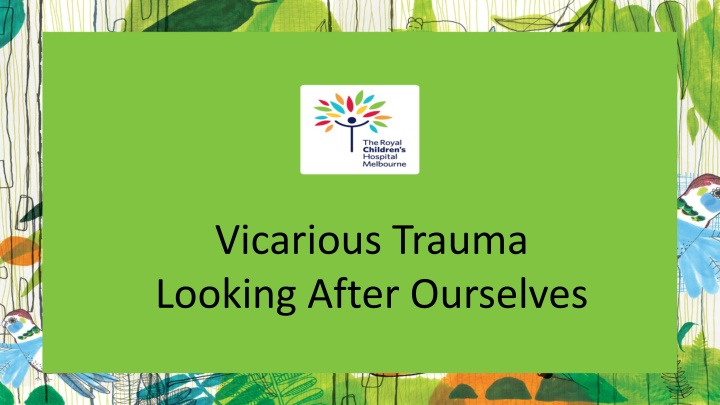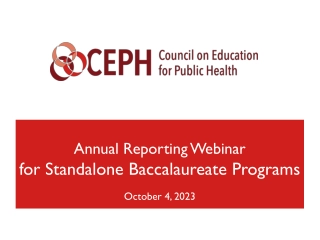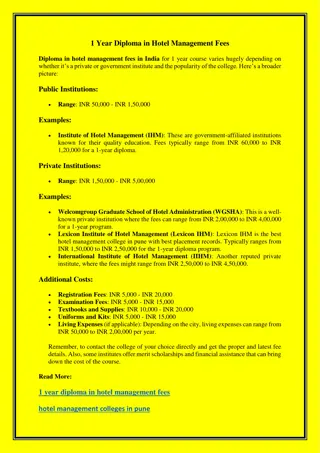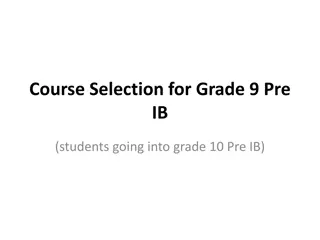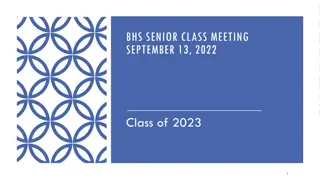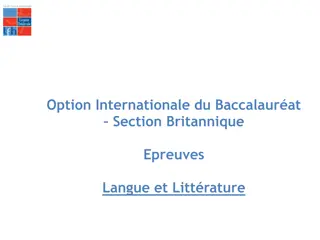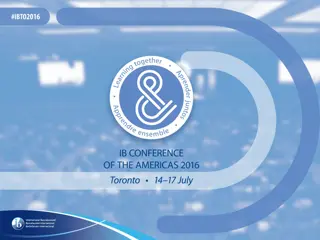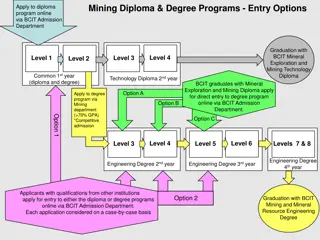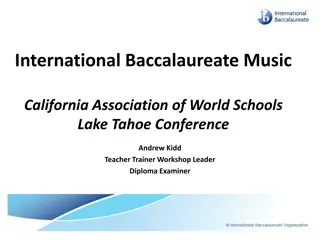The International Baccalaureate Diploma Programme
The International Baccalaureate (IB) Diploma Programme offers a unique educational experience for students aged 16-18, focusing on critical thinking, independent inquiry, and interdisciplinary connections. With mandatory subjects like Theory of Knowledge, Extended Essay, and Creativity, Activity, Service, the programme emphasizes holistic learning and assessment. Students face external evaluations, research papers, and small group work, culminating in the pursuit of an IB Diploma. Graded on a scale from 1 to 7, the IB Diploma Programme challenges students to engage with knowledge analytically, reflexively, and creatively, preparing them for higher education and beyond.
Download Presentation

Please find below an Image/Link to download the presentation.
The content on the website is provided AS IS for your information and personal use only. It may not be sold, licensed, or shared on other websites without obtaining consent from the author.If you encounter any issues during the download, it is possible that the publisher has removed the file from their server.
You are allowed to download the files provided on this website for personal or commercial use, subject to the condition that they are used lawfully. All files are the property of their respective owners.
The content on the website is provided AS IS for your information and personal use only. It may not be sold, licensed, or shared on other websites without obtaining consent from the author.
E N D
Presentation Transcript
Vicarious Trauma Looking After Ourselves
Pause for Breath Outline of what it is TED talk video Small group discussion Share ideas
Love Warmth Shelter & clothing Food Education Health & Wellbeing Protection/safety Play & social connection Medical treatment Emotional enrichment, moral/spiritual guidance/stability Appropriate stimulation
Vicarious Trauma secondary traumatic stress secondary trauma / compassion fatigue similar symptoms to PTSD differences to burn out
Trauma vs Burnout Traumatisation Safety Concerns Nightmares Intrusive Imagery Hypervigilance Burn Out No time or energy Somatic Symptoms Disconnection Cynicism Generalised despair
Vicarious Trauma Immediate Effects (associated with PTSD) Long Term Effects Altered belief systems Cognitive changes frame of reference Protection of self
Vicarious Trauma Research Assessment of Strategies and Outcomes Strategies combination of factors i.e., not just personal factors Outcomes combined approach from personal / work / peers / supervision / acknowledgement from organisation
Contributors to Trauma Work nature of it / clientele / cummulative exposure Organisational factors supervision / peer support Societal and cultural factors CPD / political involvement Personal factors you and your environment
TED Talk vicarious trauma video
Small group discussion Groups of 2-3 Share Ideas
Share Ideas Personal Factors (Awareness/ Balance / Connection) Actual Work (A/B/C) Organisational Factors (A/B/C)
Share Ideas Organisation acknowledge / balance / debrief? checks? Work supervision / peer support / case load / CPD Personal Psychological detachment / Personal Life Bigger Picture (vicarious post traumatic growth) Do you need more help? Does a colleague need more help? (GP / EAP)
References Feeling Heavy Zoe Morrison 2007, AIFS Vicarious Trauma the consequences of living with abuse NSPCC 2013 Compassion satisfaction, burnout and secondary traumatic stress in UK therapists who work with adult trauma clients Sodeke-Gregson et al Eur J PsychoTraumatol 2013 Vicarious Trauma, Secondary Traumatic Stress or simply Burnout? Devilly et al ANZJP 2009 Strategies for Reducing Secondary or Vicarious Trauma: do they work? Bober et al Brief Treatment and Crisis Intervention 2006 Vicarious Traumatization: Symptoms and Predictors Lerias et al Stress and Health 2003
